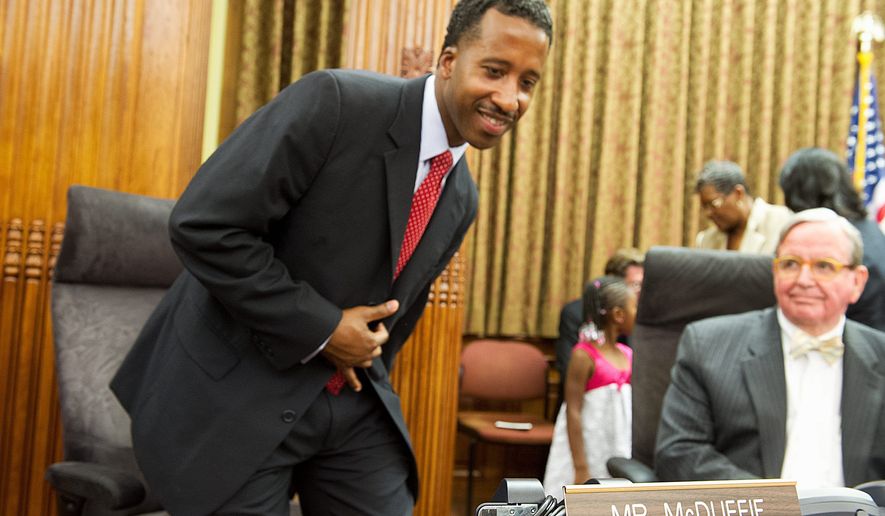The D.C. Council on Tuesday unanimously approved a sweeping anti-crime bill that includes a provision to pay would-be criminals and victims to stay out of trouble.
“One homicide in the District is one too many. We know that we cannot simply arrest our way out of crime; prevention is key,” said council member Kenyan McDuffie, Ward 5 Democrat. “This comprehensive bill is a step in the right direction.”
As proposed by Mr. McDuffie, the legislation aims take a health-based approach to quell violent crime rather than rely on incarceration for offenders who seek rehabilitation.
The legislation also would give the D.C. Department of Human Service and a newly created Office of Neighborhood Engagement and Safety a bigger role in preventing violence in the District.
The bill would establish an Office of Violence Prevention and Health Equity. The new office will develop and implement a public health strategy using “cognitive and family based therapy and service coordination to combat the spread of violence,” Mr. McDuffie said.
It also would place clinicians in all D.C. hospitals’ emergency department so that they can immediately respond to victims of crime, which Mr. McDuffie said will prevent the escalation of violence.
Constant updates on whether the programs are working will be required so those overseeing the initiatives can track if they’re working.
“As I have said all along, the District should only fund programs that work,” Mr. McDuffie said. “I believe in evidence-based approaches and will monitor and review the effectiveness of each of these initiatives to ensure that District residents’ tax dollars are being spent in an efficient and effective manner.”
The legislation’s pay-for-peace provision is based on a similar program in Richmond, California.
Under the provision, the District would pay up to $9,000 a year to as many as 200 at-risk residents as long as they participate in behavioral therapy and remain crime-free. Participation in the program would be anonymous.
Backers of the program have said it works because people respond better to rewards than to punishment.
“Punishment might get you to stop a practice, but that doesn’t persist,” Barry Krisberg, the University of California-Berkeley criminologist who helped devise the Richmond program, told The Washington Times in February. “If you want behavior to persist over time, rewards are the way to do it.”
There was little discussion on the dais prior to the vote Tuesday, but council member Jack Evans said during a morning legislative breakfast that he doesn’t agree with everything in the bill.
“I’m not happy with the bill, but I’m OK with everything,” said the Ward 2 Democrat.
The omnibus legislation directly counters a crime package D.C. Mayor Muriel Bowser presented to the council last year that sought more enforcement-based initiatives, including stiffer sentencing for certain offenders. Ms. Bowser’s tough-on-crime bill was introduced but never considered by city lawmakers.
Ms. Bowser, a Democrat, chided the council in January for noting taking up her bill, saying her legislation would have helped blunt last year’s spike in homicides.
The Metropolitan Police Department recorded 162 homicides in 2015, a 54 percent increase over the previous year.
• Ryan M. McDermott can be reached at rmcdermott@washingtontimes.com.




Please read our comment policy before commenting.